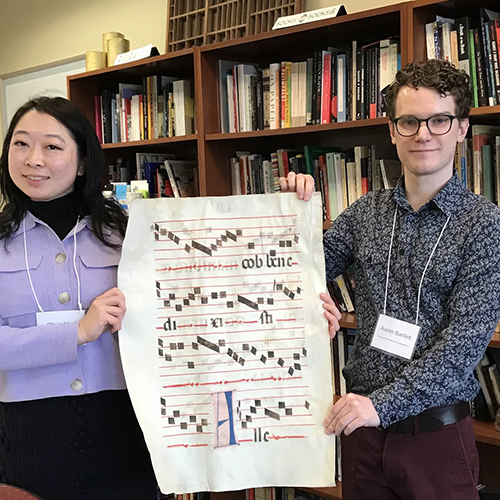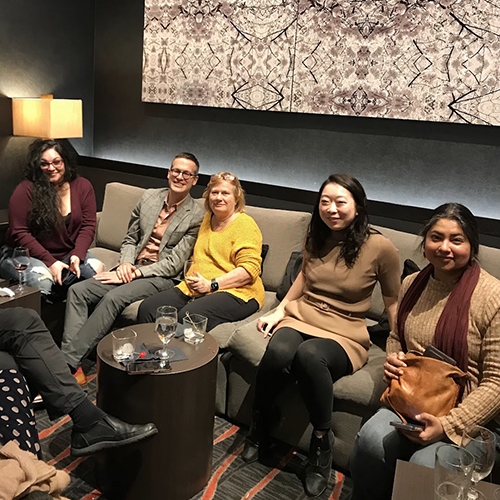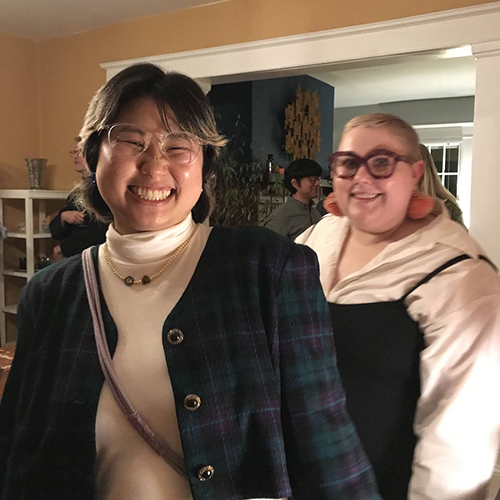


The Dickens Universe Graduate Winter Conference was a resounding success at the beginning of March. Graduate students from across the Dickens Universe Consortium assembled at the University of Maryland, College Park, to share research on Charles Dickens and nineteenth-century literature.
Dr. Sukanya Bannerjee of UC Berkeley was the keynote speaker, sharing her work on loyalty in the nineteenth century and examining how A Tale of Two Cities manifests important ideas about loyalty that have been overlooked in scholarship. Graduate students continued the interest in A Tale of Two Cities, following its treatment at the 2023 Dickens Universe, with Emily Anderson (Rutgers) discussing the interchangeability of characters in Tale and Mayrose Beatty (also of Rutgers) considering Sydney Carton as a “retributive force” in the novel.
There was also broad interest in Dickens’s work as a whole. Krista Barrett and Soyoo Park, both of Louisiana State University, covered David Copperfield. Barrett considered Mr. Dick as an instance of disability complicating nineteenth-century norms about the ideal nuclear family; she argued that Mr. Dick’s cognitive disability makes it “possible and natural” for him to choose a family at Miss Betsey’s cottage. With Mr. Dick, Dickens makes room for alternative forms of family relations within middle-class Victorian standards. Park treated Miss Rosa Dartle as a character who diverges from Victorian domestic ideals.
Park, along with Jessica Monaco (Stanford), Margaret Bowlin (University of Iowa), and Amber Walters-Molina (University of Tennessee, Knoxville) was part of a resonant panel that looked at instances where woman characters in Victorian novels demonstrate resistance to gender norms in subtle ways that have been previously overlooked. Monaco discussed Bleak House, arguing that Esther Summerson should be read as a gothic heroine akin to the protagonists of the gothic romances of Ann Radcliffe and Regina Maria Roche in the 1790s. Esther, Monaco argued, is a “smart, brave, active participant in …unraveling” the mystery around her family history, a mystery that could have come right out of a gothic novel. Bowlin considered the idea of the “Fallen Woman” in Elizabeth Gaskell’s Ruth, reading the novel alongside Unitarian theology (Gaskell’s husband was a Unitarian minister), and she argues that we should read Ruth’s death as atoning for the sins of others, rather than for her own. Walters-Molina looked at the sensational Lady Audley’s Secret, and the way the scheming Lady Audley becomes a modern master of the railways in order to sneak across the countryside and perform her dark deeds.
Other grads examined wider topics in nineteenth-century literature. Eliza-Alexander Wilcox, also of the University of Tennessee, Knoxville, called attention to Lord Byron’s overlooked closet drama The Deformed Transformed and its complicated portrayal of disability, gender, and bodily transformation. Aaron Bartlett (University of Maryland) looked at William Morris’s The Earthly Paradise in comparison to modern AI technology, finding that Morris develops an idea of the poetic voice as “simulated.” Rowan Morar of Rice University examined drug use in Wilkie Collins’s The Moonstone, highlighting the ideas Victorians had about drugs as being very different from our own. Nina Cook, also of Rice University, presented her research on direct address in the work of Charlotte Brontë—moments where the narrator instructs the reader to imagine something, thus inviting the reader into a conversation with the book.
The conference was a stimulating affair, and Dickens Universe faculty were on hand to offer rich feedback and advice to our community of early career scholars.
